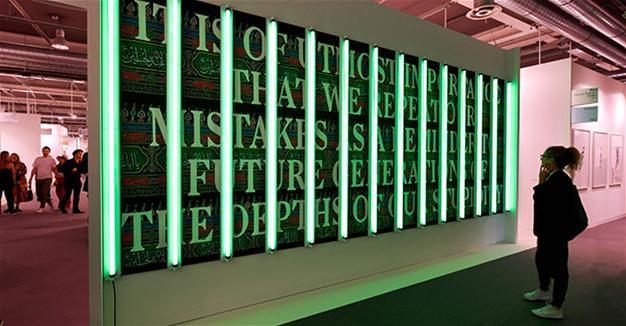Political turmoil finds artistic outlet at Basel fair
BASEL, SWITZERLAND - Agence France-Presse
 Hundreds of glass bottles suspended in nets or hanging from chains hauntingly illustrate the horrors of the slave trade, while 40,000 golden bullets are poised menacingly above an egg-covered surface.
Hundreds of glass bottles suspended in nets or hanging from chains hauntingly illustrate the horrors of the slave trade, while 40,000 golden bullets are poised menacingly above an egg-covered surface.The global political turmoil has left its mark on many of the works on display at this year’s Art Basel, the world’s biggest contemporary art fair.
With allusions to mass-migration tragedies, political populism, violent extremism and protest movements, even the more historically focused pieces appear to speak directly to today’s angst-provoking realities.
“This edition of Art Basel was chosen at a particularly political time,” the fair’s director, Marc Spiegler, said ahead of the public opening on June 15.
He said many recent pieces allude to the current political turbulence, but there are many others that are “particularly relevant even though they were made 10, 20, 30 years ago.”
“The reality is that certain topics recur and that an artwork that was addressing that topic 30 years ago may seem particularly salient today,” he said.
That is the case for American artist Barbara Kruger, who takes on xenophobia and the rise of political populism in a piece made in 1994 that nonetheless seems to speak directly to a world colored by Brexit and the rise of leaders such as U.S. President Donald Trump.
Her huge poster “Our people are better than your people” displays a hate-filled message claiming to be “more intelligent, more powerful, more beautiful, and cleaner.”
South African artist Sue Williamson’s vast installation “Messages from the Atlantic Passage” is new, but depicts a historical tragedy that still resonates.
The piece represents five of the 36,000 voyages that carried 12.5 million Africans to America as slaves from 1525 to 1866.
Muddied bottles, each engraved with information about a different slave, fill fishing nets suspended from the ceiling and hang from chains that feed into bottle-filled pools of trickling water.
“This is just a little sample of... this enormous group of millions who were taken,” Williamson said, drawing parallels to today’s “vast migration of people from countries which are politically unsafe, politically desperate.”
“People crossing the Mediterranean in boats, drowning, and in this case they are willingly or not willingly forced by circumstance to try to seek a better life.”
Elsewhere in the fair, Brazilian artist Cildo Meireles’s “Amerikkka” allows visitors who remove their shoes to gingerly walk on a red base covered with more than 20,000 white wooden eggs.
Above them hangs a ceiling that appears to be closing in, covered with 40,000 bullets.
Along with the allusion to the Ku Klux Klan in its title, this gives the piece a distinctly threatening feel, seeming to evoke how minorities might experience swelling rightwing extremism.
Political ugliness
Other artists at Art Basel, meanwhile, explore reactions and solutions to political ugliness.
In the face of growing intolerance, Indian artist Subodh Gupta welcomes visitors into his installation “Cooking the World” - a shack made of pots and pans where he cooks and shares a meal, which he describes as “the strongest indicator of inclusion and acceptance into a community.”
And American artist Susan Hiller’s “Die Gedanken sind frei” is a collection of more than 100 political songs dating as far back as the German peasant revolt of 1524.
Visitors can read texts of the songs on the walls, ranging from “We shall overcome” to Donna Summer’s “She works hard for the money,” and can pick which ones to play on a jukebox in the middle of the room.
“Extreme political situations generate lots and lots of music,” Hiller said, adding that today’s political context was so “strange” it was unclear what kinds of songs it would produce.
Nostalgically, she said her collection included “extremely good songs in Arabic which came out of the Arab Spring. But that has all turned into something else. Those songs in a way are now a tragic reminder of some hopes that have died.”
















